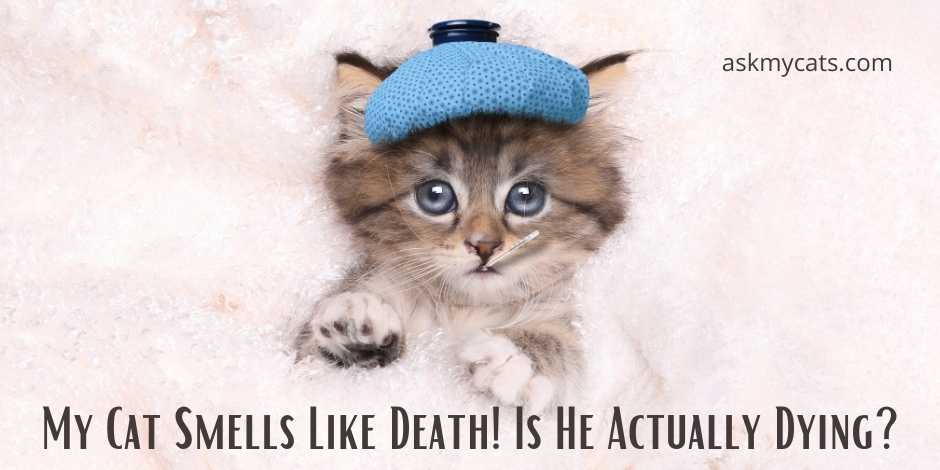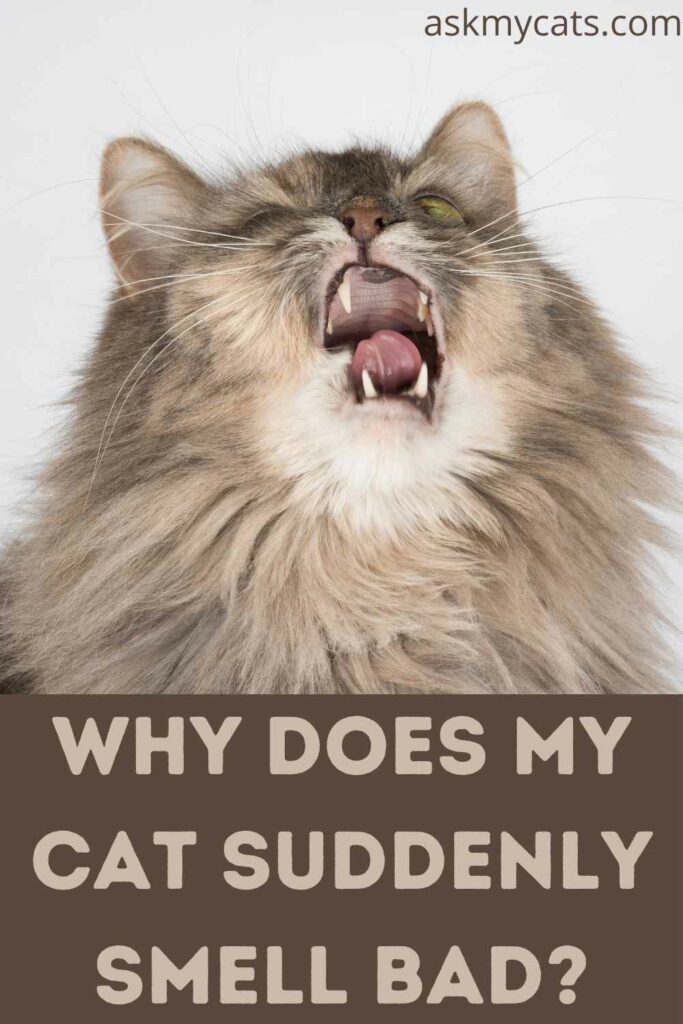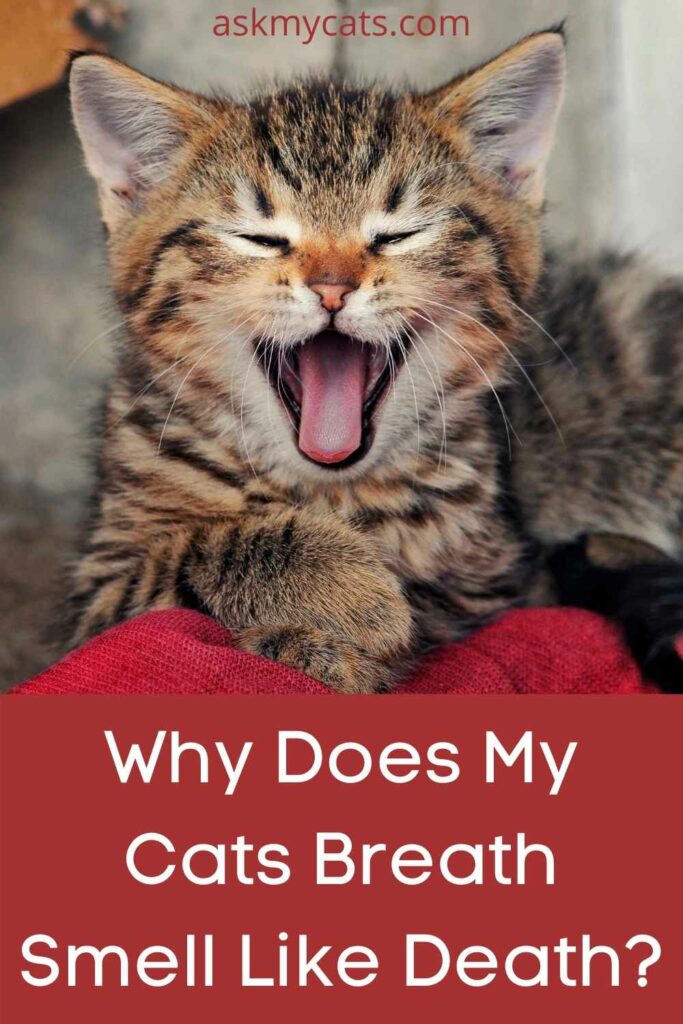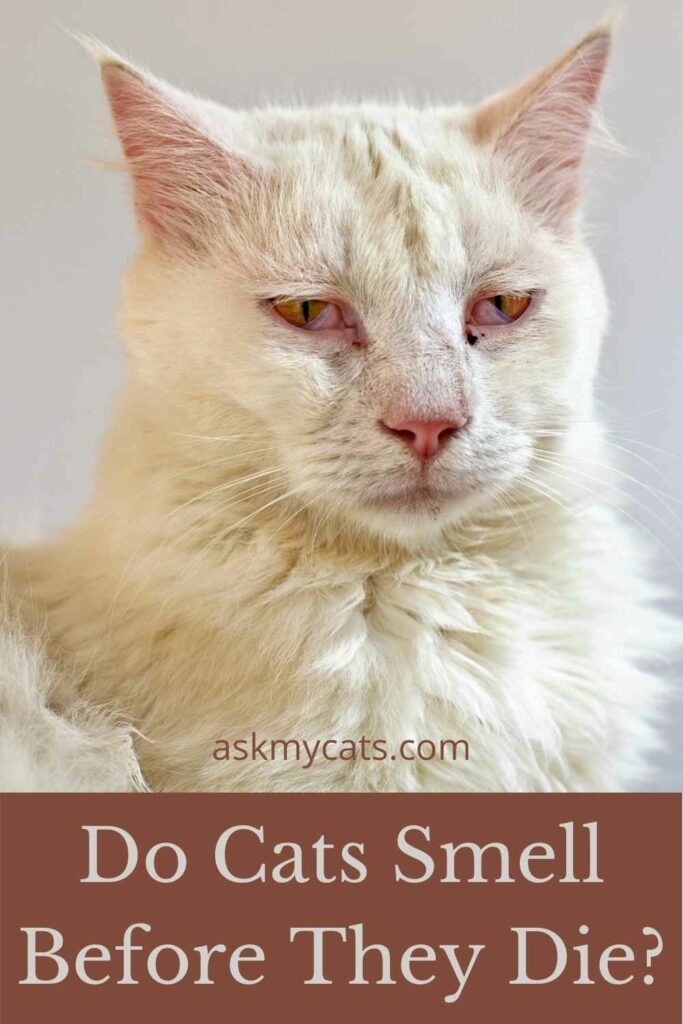You must create a crucial distinction when you remark to yourself, “My cat’s breath smells like death.” This distinction is whether you’re asking whether your cat stinks terrible or if it smells like it’s about to die.
Skin odour in cats might be caused by an underlying health problem, a wound, an allergy, a parasite, or anything else that disrupts the skin’s normal functioning. If your cat has a foul odour, it’s possible that there’s an issue beneath their fur, and you should take them to the doctor to get it looked out.
Both are concerning indications for your cat’s health, but one is more so than the other. Let’s learn all the possibilities in detail!


Give Your Cat the Perfect Day
Get the Free Ebook!
Why Does My Cat Suddenly Smell Bad?
The most prevalent cause of apparent bad odour in cats is halitosis. Animals’ urine and excrement are typical causes of odour. Cats may be soiling themselves owing to urine or faecal incontinence, or they may be unable to remove it from their hair coat due to a lack of grooming skills.

Another consideration is determining the source of the odour. The stench emanating from your cat’s mouth might be caused by a variety of factors. If the foul odour is coming from the other end, we’ll have to examine a variety of options.
If your cat has foul breath (also known as halitosis), it’s crucial to figure out what’s causing it. We must also define what constitutes a “poor” odour. Your cat’s breath will smell like cat food if they’ve recently eaten.
The scent of cat food is frequently unpleasant to us since it is created from animal items that are not always edible for people. This isn’t to say the cat doesn’t like it, and we need to be aware that this is a common occurrence.
When a cat’s breath smells like rotten meat, we need to be aware that this might indicate a problem. Some people offer raw food to their pets. If that’s the case, we’ll have to make sure the meat we feed them isn’t spoiled. Unfortunately, if our cat’s mouth smells like rotten meat, it might be a sign of a more serious health issue.
Our cat’s teeth and gums are an excellent sign of his or her general health. If they have a bad odour coming from their lips, it might be one of the following:
1. Dental Infection
It’s probable that your cat has a dental condition if they have a fishy odour emanating from their mouth. Gum disease, also known as periodontal disease, is the “most prevalent oral illness in cats”. The severity of the illness varies.
You may see gingivitis in its early stages, which appears as reddish and irritated gums. Periodontitis might develop if the issue is not addressed. This might result in receding gums and possibly tooth loss. Gum disease can cause halitosis, which is a symptom of the condition.
2. Faucitis
Gingivitis is frequently caused by a bacterial infection. Faucitis can occur if the bacterium spreads to other areas of the mouth. Faucitis is defined as vesicular, ulcerative, and subsequently proliferative mucosal lesions. Halitosis is frequently a side effect.
The etiology of Faucitis, which might be a viral or bacterial infection needing antibiotics, will determine the course of treatment.
3. Feline Coronavirus
This is a viral illness that causes the cat to become Immunocompromised. They will be less able to fight sickness and will grow quite frail as a result. Fever, lack of appetite, and tiredness are common accompanying symptoms, but you may also examine their gums.
Your cat has red gums and foul breath if you check at the mucous membranes in their mouth. Although there is no treatment for feline coronavirus, you can treat the symptoms and boost their immune system. It is feasible to prevent the disease by following a proper immunization regimen.
4. Feline Calicivirus
This is another viral illness with signs of gingivitis and halitosis. The intensity of the infection will vary depending on the organism that causes it, since some are more aggressive than others.
This virus, commonly known as feline HIV/AIDS, may be avoided by immunisation. The signs and symptoms of this condition vary, and they aren’t usually evident at first. You may not notice the signs since the cat has been asymptomatic for a long time. The smell of foul breath coming from your cat’s mouth might be the first clue that anything is wrong.
If your cat smells like death, you may be concerned that he or she is about to die. Some of the illnesses listed in this article are life threatening, as you can see. If your cat has foul breath, it’s critical to figure out what’s causing it. Visit your veterinarian for a diagnosis, and they will advise you on the best course of action.
Why Does My Cats Breath Smell Like Death?
Bad breath is most likely caused by odour-producing bacteria that develop on your cat’s teeth and gums. If you don’t brush your pet’s teeth regularly, tartar and plaque can build up, resulting in an overabundance of microorganisms.

Many of the problems listed above are caused by the cat’s immune system being suppressed. This indicates that their entire body is in pain, and their mouth is displaying the signs. You’ll need to look at other symptoms to figure out what’s going on.
If your cat is drooling and has foul breath, it is typically an indication that the condition is becoming worse. Immunocompromised cats are also more susceptible to other illnesses, such as cancer.
This is why, if your cat’s breath begins to smell for no apparent cause, you should take them to the veterinarian. You may see some lesions in your cat’s mouth if you take them to the doctor for foul breath. In cats, lesions or ulcers are frequently seen.
A 2016 research looked at some of the several viral illnesses that might cause mouth sores (and also bad breath). They discovered that “other immune-mediated illnesses, eosinophilia granuloma complex, gastrointestinal system disorders, diabetic mellitus, hepatic disorders, and chronic renal failure” are all linked to oral issues, in addition to some of the conditions mentioned above.
While gastrointestinal problems might cause unpleasant odours to emanate from a cat’s mouth, it’s also conceivable that cats smell in other areas. However, this may not be the sole source of a foul stench emanating from their genitalia.
Defecation difficulties can be caused by gastrointestinal disorders, the most common of which is diarrhoea. However, diarrhoea and its foul odour might be a sign of a variety of other health issues.
When a cat consumes something it shouldn’t, interacts with sick cats, or even eats excrement, parasites might be ingested. The parasites can deplete nutrients from the cat’s diet during an infestation, resulting in malnutrition.
While we may believe that our cats have little to worry about other than where they will take their next sleep, there are a variety of factors that might cause them concern. Because foul-smelling faeces and flatulence are both stress signals in cats, the scent of death in your cat’s rear might be a sign of environmental stress.
Not only that, but if your cat has a disease like feline herpesvirus-1 (FHV-1), stress can trigger an outbreak, with diarrhoea as a symptom.
Why Does My Cat Ear Smells Like Dead Animal?
The cat’s inner ear is close to its brain, and if the brain is invaded, the cat may die. An infected cat’s ears may soon be stinky. Ear mites are easily identified by their distinct yeasty odour.
The ear canals are delicate, and ear infections cause pain and suffering. Many cats shake their heads and scratch their ears to get the dirt and moisture out of their ear canals. The ears become red and irritated, and an unpleasant odour may emerge. It’s usual to see a black or yellow discharge.
Ear mites can produce a black discharge, itching, and head shaking, among other symptoms. Ear mite infections, on the other hand, are most common in kittens and outdoor cats. Adult cats’ ear mites are particularly common once a kitten with ear mites is introduced into the home.
Ear mites can sometimes produce an environment in the ear canal that encourages the growth of a secondary infection caused by bacteria or yeast. The mites may be gone by the time the cat is brought to the veterinarian, but a serious ear infection may still be present.
Do Cats Smell Before They Die?
Cats like grooming themselves, therefore as they become older, they lose the stamina to do it, and their fur becomes untidy and dirty. As their organs begin to shut down, they will also have a noticeable scent owing to toxins piling up.

Cats are known for their ability to conceal injuries and diseases. This is an excellent survival trait in the wild, as exhibiting any hint of weakness makes a cat a target for predators and competition.
However, when it comes to our beloved cats, this might be a difficulty for us caring owners who wish to support them through any illness or suffering.
We must keep a careful eye on our cats and pay attention to small changes that signal anything is wrong.
Many of the indicators that your cat is reaching the end of her life are also symptoms of diseases including chronic renal disease, hyperthyroidism, cancer, and diabetes. When you detect that something is amiss with your cat, the first thing you should do is have her evaluated by a veterinarian.
Your vet will be able to inform you whether your cat has a treatable disease or if the outlook is gloomier based on the exam and any diagnostics conducted.
Frequently Asked Questions
Why does my cat smell rotten?
A cat’s general odour might be caused by skin illnesses. If the illness is severe, the cat’s coat may thin and inflamed skin may be apparent. After touching a cat with a severe skin illness, you may detect a greasy, foul film on your hands. Bacterial or fungal overgrowth is usually the source of the stench.
Why does my cats butt smell so bad?
Scent glands are located directly within the rectum of cats. They can get infected, resulting in anal gland contents spilling or possibly an infection and abscess. All of these situations might cause a foul odour to emanate from your cat’s rear end.
How do I stop my cat from smelling?
Baking soda may be put to your cat’s litter to help with odour control. Scoop the litter box at least once a day, but more often is preferable. If this isn’t an option, choose one that does the work for you automatically you just have to remember to empty it at least once a day.
Final Words
There is no scientific proof that individuals who are terminally sick generate a unique smell, but a lot of animal specialists across the world believe that a cat’s capacity to detect imminent death is the consequence of a specific smell emitted by humans on the edge of death.
Drop your questions in the comments section below!
